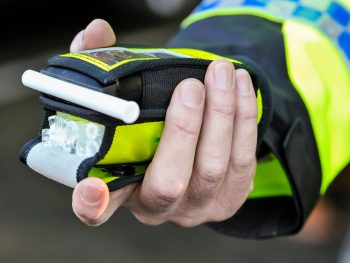Lower drink-drive limit and increase enforcement, government told
The UK’s system to prevent drink-driving is no longer adequate and needs a major review – including a lower limit and improved enforcement.

The PACTS report says the police should have mandatory breath testing powers and that the reduction in enforcement levels must be reversed
That’s according to a new report from the Parliamentary Advisory Council for Transport Safety (PACTS), which says drink-driving is one of the biggest causes of road deaths (13%) and the risks have become worse in the pandemic.
In the last decade 240 people have been killed each year where a driver was over the limit.
Compounding the issue, the coronavirus pandemic has seen an increase in the number of people with alcohol and mental health issues. A recent report by the Royal College of Psychiatrists on the back of Public Health England data has revealed that the number of people drinking at high-risk levels has doubled to nearly 8.5 million since February.
But levels of police enforcement have decreased by 63% since 2009 and there are indications that drivers believe they are less likely to be caught.
The research by PACTS also shows nearly one in five (17%) drink-drive offences is committed by a reoffender. One person who was found to have committed the offence ‘driving or attempting to drive with drug level above the specified limit’ had 18 previous drink- and drug-driving offences.
To tackle this, the PACTS report says the police should have mandatory breath testing powers and that the reduction in enforcement levels must be reversed. Recently published Home Office data shows the number of breath tests carried out in 2019 was at its lowest level in 18 years, reflecting the huge reduction in the number of dedicated traffic officers on the roads.
Yet, the number of drink-drive crashes in the UK rose 3% in 2018, according to latest DfT figures, while 240 people died in crashes where at least one driver was over the drink-drive limit; down from the central estimate of 250 for 2017 but similar to levels seen since 2010.
The PACTS report also calls for a lower breath test limit for England and Wales; the limit in Scotland was reduced in December 2014, bringing it in line with other countries in Europe while Northern Ireland has passed legislation to lower its limit to match Scotland but not started enforcing this yet.
The report also calls for increased penalties for drivers who combine drink and drugs and for specialist rehabilitation courses for those with mental health and alcohol problems.
David Davies, executive director of PACTS, said: “After 10 years of declining levels of enforcement and social media campaigns aimed at young men, it is time for a new, more comprehensive approach to reducing the toll of drink drive deaths and injuries.
“Drink driving is often cited as a road safety success story, yet it remains a major killer and progress has ground to a halt since 2010. Not only is better enforcement important but also the issues of mental health and alcohol dependency need to be recognised.
“The problem is not a simple one of law enforcement. It requires a more comprehensive approach. The legal limit should be reduced in England and Wales, police should be given additional powers to test drivers, the High Risk Offender Scheme should be reformed, rehabilitation courses should be designed for those with mental health and alcohol problems, and the growing danger of combining drink and drugs driving needs to be addressed.
“Scotland introduced a reduced drink drive limit in 2014, in line with most other countries in Europe. It has been accepted by the public; it has not significantly impacted pubs and restaurants or overloaded the police or the courts. Northern Ireland plans to go further, with a zero limit for novice and professional drivers.
“A lower limit is not a magic bullet but government polices to reduce drink driving will lack credibility as long as they avoid this change.”
To access the PACTS report, click here.












